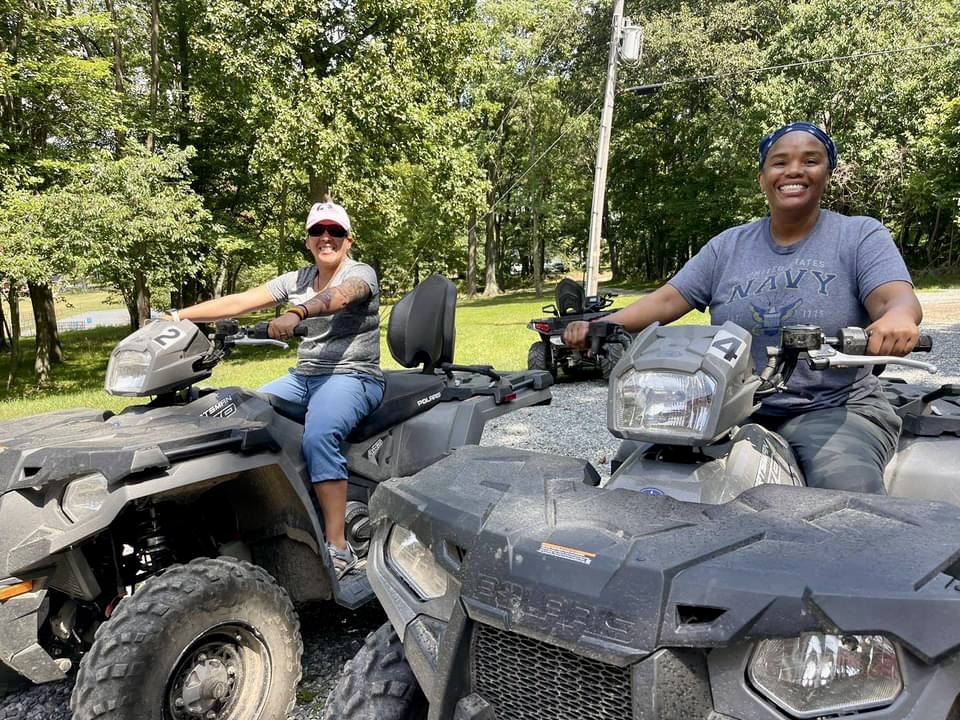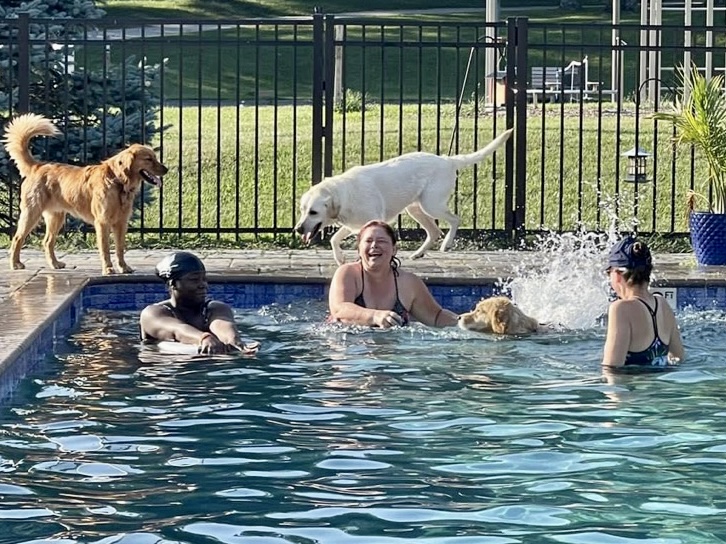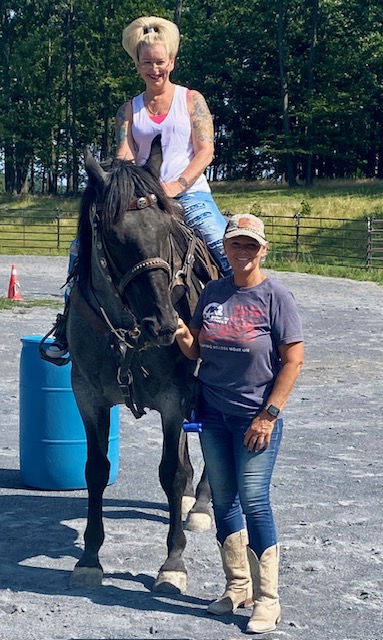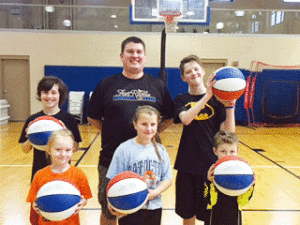Lisa C. Cantwell
Seven female combat Veterans enjoyed a four-day getaway recently at Heroes Ridge, a 275-acre retreat complex located atop Raven Rock Mountain near Fairfield, Pennsylvania. Activities included ATV riding on the wooded trails, horseback riding, roping, swimming, painting, yoga, karaoke, dancing around the firepit and a carriage ride tour of the Gettysburg battlefield. The ladies also enjoyed getting their nails groomed during a special “Spa Day” themed luncheon.
“Females are often the forgotten Veterans,” said Cindy McGrew, founder and CEO of the nonprofit Operation Second Chance (OSC) that manages the gated retreat camp. Leah, one of the attendees from Kansas City and a Navy veteran agreed, “We, as a society, have to begin thinking that Veterans might be women, too.” She relayed the license plate frame on her car reads “U.S. Navy Retired” and that people often remark, “Please thank your husband for his service.” “I told them, ‘It’s ME’! That people who serve are both men AND women.”
According to the VA website, more than two million women Veterans reside in the U.S. In 2021, the U.S. Department of Defense recorded that women made up 17 percent of the active-duty force and 21 percent comprised the National Guard/Reserve population. The VA states that women are the fastest growing group in the Veteran population.
The gathering at Heroes Ridge offered these minority service members a safe and fun environment in which to share their experiences with one another, thereby supporting each one’s journey of healing and recovery. Leah shared, “Being here has been so important to my recovery, I just don’t feel like I fit in unless I’m with other female vets.” Accompanied by her service dog, “Garet,” she also shared that she was celebrating her 46th birthday, “My injuries had me in a coma for four weeks. I was told I’d never live past 40 and that I’d never walk again. Well, here I am!” All of the women at the retreat presented her with a round of happy birthday wishes and personal tributes. She shared that her favorite experience during the weekend was around the campfire, as the ladies sang and danced in train formation when they found out it was her birthday. She also loved swimming in the pool with her dog. Leah has known Cindy McGrew for six years and noted, “Everything Cindy does in her life is for veterans, and that’s what Heroes Ridge is all about.”
Theresa, an Army Veteran from Southern Maryland, said this was her second trip to Heroes Ridge. McGrew met her at Walter Reed Hospital over 12 years ago. “She couldn’t walk or talk. She’s come such a long way! Her road to recovery has been a difficult one,” McGrew said.
At dinner, Theresa shared her story of overcoming serious injuries with her comrades. She gave Cindy McGrew much praise saying, “She saved my life!” McGrew quickly responded, “Oh no! I didn’t do that. God did!” Theresa has recently been hired by McGrew as an intern with OSC.
“What I love about this particular retreat is that it caters to women exclusively. We can just enjoy some fun in a non-competitive atmosphere,” Theresa observed. “To be able to connect with other women vets and experience new things, share stories, learn what works and what doesn’t is invaluable. It’s reassuring just knowing there are others that understand.” Recognizing the need for female Veterans to connect, she began a group for this underserved population that meets monthly in her community. Her favorite activity at the retreat was horseback riding, noting that experience was much better the second time around.
She said, “It was so calming, and I felt empowered. Riding gave me a sense of accomplishment.” She recently completed a research course at Harvard and hopes to apply her knowledge toward a future study on women in military service.
In addition to fully funded retreats at Heroes Ridge, the highly rated non-profit has other getaway locations for Veterans nationwide in Texas, Florida, Colorado, Montana, and South Dakota, to name a few. To date, OSC has provided over $16 million to assist our nation’s heroes and their families in the form of mortgage and rent payments, airline and Amtrack tickets, lodging, essential living expense items, and recreation and entertainment fees.
For more information on retreats for Veterans and their families at Heroes Ridge at Raven Rock and about Operation Second Chance (OSC), please visit the website at operationsecondchance.org.
Cover Photo Lead-In: Leah gives “Cactus” a pat during riding and roping activities at Heroes Ridge.
Note: All Veterans requested that their first name only be used.

Sara and Kimberly enjoy the thrills of ATV riding during Heroes Ridge Women Veterans Retreat.

Pool playtime with the service dogs at Heroes Ridge Women Veterans Retreat.

Chris, a combat Veteran, mounted on “Pepsi” at Heroes Ridge. She’s being led by CEO and founder, Cindy McGrew.

 The Fitness Frenzy weekend included a free sampling of group exercise classes, free day passes to the Community Center, and displays from local health agencies. Instructors led group workouts for Zumba, Les Mills BODYPUMP, Yoga, Pilates, Mix It Up, and Senior Stretch. Each sampling lasted approximately fifteen minutes. Organizations promoting health and fitness were onsite to share information and encouragement to Community Center members and visitors. Among the vendors were the Washington County Sheriff’s Office, Washington County Health Department, Heal of Washington County, Visiting Angels, Synergy Massage & Wellness Center, and doTerra representatives.
The Fitness Frenzy weekend included a free sampling of group exercise classes, free day passes to the Community Center, and displays from local health agencies. Instructors led group workouts for Zumba, Les Mills BODYPUMP, Yoga, Pilates, Mix It Up, and Senior Stretch. Each sampling lasted approximately fifteen minutes. Organizations promoting health and fitness were onsite to share information and encouragement to Community Center members and visitors. Among the vendors were the Washington County Sheriff’s Office, Washington County Health Department, Heal of Washington County, Visiting Angels, Synergy Massage & Wellness Center, and doTerra representatives.